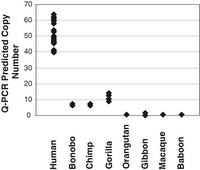 I had written before about the importance of large scale genomic differences in human evolution. Now, a new paper in Science presents clear evidence that a particular gene, MGC8902, which encodes for a protein of unknown function, has the largest number of copies (212) in humans, compared to other primates. A related story in LiveScience. John Hawks comments.
I had written before about the importance of large scale genomic differences in human evolution. Now, a new paper in Science presents clear evidence that a particular gene, MGC8902, which encodes for a protein of unknown function, has the largest number of copies (212) in humans, compared to other primates. A related story in LiveScience. John Hawks comments.Science Vol. 313. no. 5791, pp. 1304 - 1307
Human Lineage–Specific Amplification, Selection, and Neuronal Expression of DUF1220 Domains
Magdalena C. Popesco et al.
Extreme gene duplication is a major source of evolutionary novelty. A genome-wide survey of gene copy number variation among human and great ape lineages revealed that the most striking human lineage–specific amplification was due to an unknown gene, MGC8902, which is predicted to encode multiple copies of a protein domain of unknown function (DUF1220). Sequences encoding these domains are virtually all primate-specific, show signs of positive selection, and are increasingly amplified generally as a function of a species' evolutionary proximity to humans, where the greatest number of copies (212) is found. DUF1220 domains are highly expressed in brain regions associated with higher cognitive function, and in brain show neuron-specific expression preferentially in cell bodies and dendrites.
Link

No comments:
Post a Comment